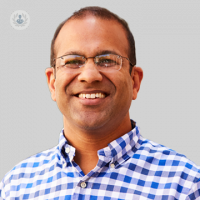Pancreatic cancer: who is most affected?
Written in association with:Pancreatic cancer is one of the world’s deadliest cancers. Knowing more about the disease, its symptoms, and whether you might be at risk of developing pancreatic cancer may help improve chances of survival. Internationally renowned surgeon, Professor Hemant Kocher, spoke with us recently to answer some commonly asked questions about pancreatic cancer.

What are the symptoms of pancreatic cancer?
In the early stages, pancreatic cancer may not cause any symptoms, making it difficult to diagnose. The first noticeable symptoms of pancreatic cancer are often pain in stomach area or back.
Yellowing of the white area in the eyes (jaundice) as well as the skin and dark yellow or orange urine, and pale-coloured faeces.
What is the incidence of pancreatic cancer compared to the past, and how is it expected to rise in the future?
Based on current studies, there is one out of ten thousand people in the Western population who will get pancreatic cancer. In the future its meant to rise as the population ages, and it will be the third most common cause of cancer-related death after lung and breast cancer. This is due to a combination of increasing incidence but also due to the lack of treatment options for pancreatic cancer in comparison to other cancers.
Who is the most affected?
It’s usually seen in people in their 60s, 70s and 80s, however increasingly in people as young as 40 have been seen with this problem. People who smoke are two times more likely than people who do not smoke. Some pancreatic cancers run in families and genetic testing is required if your family has experienced two types of pancreatic cancer or many types of cancers, amongst very close relatives.
Does our diet play a role in this change? What about alcohol?
Alcohol is meant to increase likelihood but it’s not confirmed. Diet doesn’t have a significant role in the likehihood of developing pancreatic cancer.
There are significant changes which may affect a patient adversely when they have developed pancreatic cancer. This is because of lack of pancreatic juice and bile in the bowel due blockage of those organs.
What other factors may be involved?
Some families may experience more of a likelihood if their families have increased risk of breast, ovarian or colon cancers. If you have a combination running amongst your close relatives, then genetic counselling or testing is advised.
If you feel you may be at risk of pancreatic cancer and feel genetic testing may be appropriate, we recommend booking an appointment with an expert such as Professor Hemant Kocher via his Top Doctors profile.


